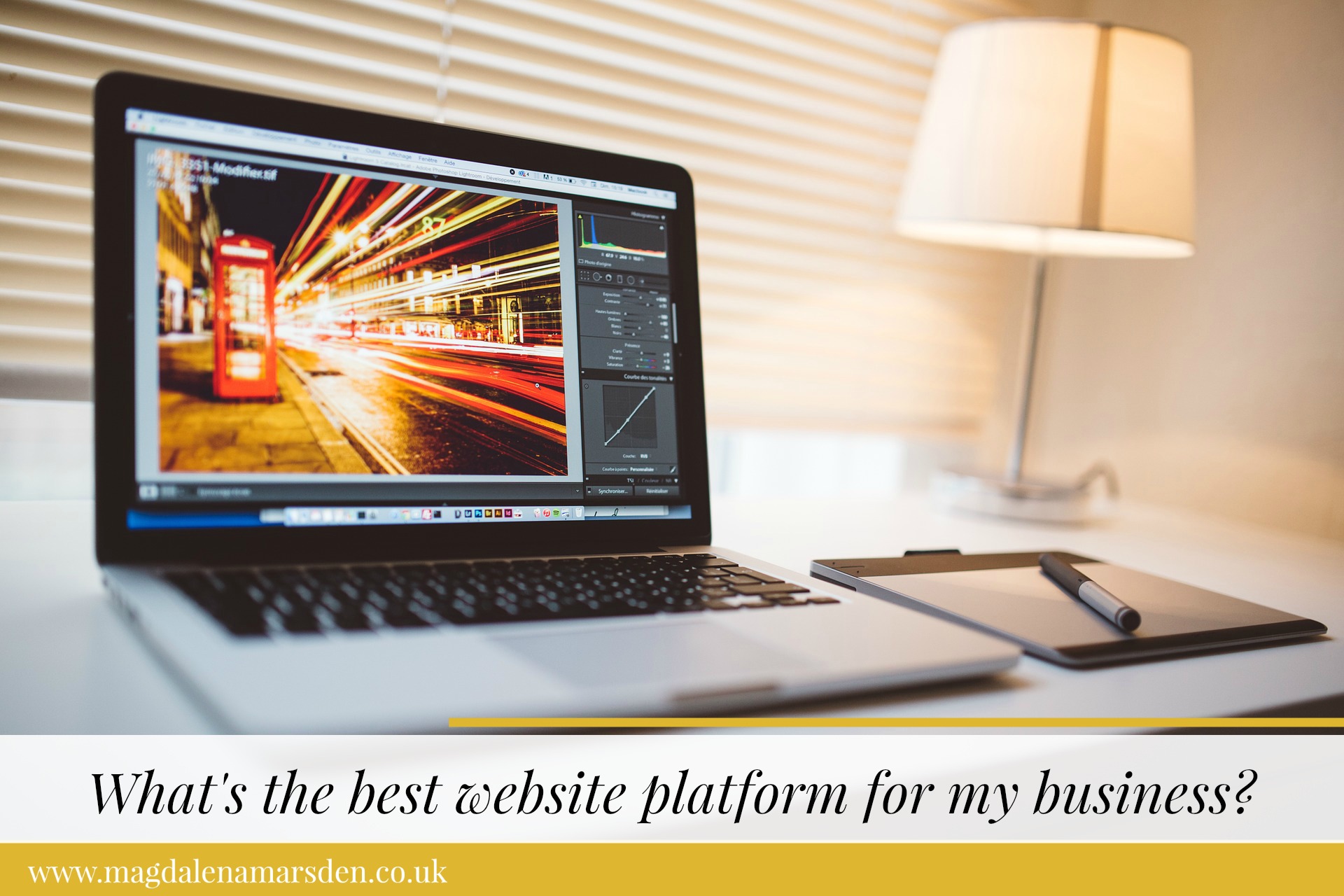This is one of the most commonly asked question, that I hear in various online forums and the one that get’s everyone fired up. The answers, as helpful as some of them are, mainly consist of personal recommendations and the type of website that everyone has.
‘Squarespace is the best one!’
‘Oh, no don’t bother with that, you have to have WordPress website if you are serious about your business!’
‘No, of course not! You don’t want to have your website hacked in all the time, you need to have……..’
And so it goes on…
Which obviously leaves the person who asked the question even more confused then before. It’s because, nobody is asking the right questions and nobody is really thinking about the person who asked the question in the first place.
So, here is what I think!
And the best one is…..hold for it….here it comes…..CUSTOM CODED WEBSITE!
It will look professional, bespoke with all the bells and whistles and nobody will hack in to it. There you go, that will be at least £50K to start off and anything up to £100K if you need e-commerce added in.
Oh, you don’t have £50K right now ? But you wanted the best website for your business?
I know I’m being very flippant here, but in all seriousness it’s not just about the ‘best website platform’ for your business. it’s about how much time you want to devote to learn about websites and on-going maintenance (if you are going the DIY route) or how much money you are prepared to spend.
So, here is what I normally suggest:
If you are taking the DIY route
Let’s be honest here, some website builders are better then others and they all have various cost attach to them. Either in form of time or money.
But, no matter how sophisticated the website platform is, if your website copy sucks, you have dreadful pictures, mismatched graphics, colours and fonts, don’t embrace social media, blogging and SEO, your website will probably fail no matter where it’s hosted.
So, providing that you got this sorted, let’s continue exploring the options.
WordPress
WordPress was originally intended as a blogging platform, when it was launched in 2003. Since then it has developed in to a robust website building platform that has no limits.
What’s so good about it?
- It’s free – you can literary get away with building your website for free using widely available templates and plugins
- Your website can look really polished and professional
- You can easily optimise your website for SEO
- The website options, layouts and functions are endless
What’s not so good about it?
- WordPress is not for beginners unless you have a tons of spare time to learn or somebody who will do the set up for you. Even if you are fairly technically minded, it’s still a learning curve.
- You probably won’t get around building a decent website (that’s not looking like everyone else’s) without learning a bit of coding
- Whilst a lot of good plugins are free, some really good ones are not. It could be anything from £10-£199 a year, but it all adds up.
- If you are going with WP you really should go with wordpress.com which is self-hosted WP. This means you need to get your own domain (you should get that anyway) and separate hosting for your website. Domain cost is per year and it really depends on your chosen name – it could be around £2.99 a year. Hosting is slightly more expensive, but if you shop around you can find it for around £29 a year.
- Unless your website is fully managed by somebody else, you have keep the website in the tip top condition. This means regularly (at least weekly) backing up your website, updating all your plugins to make sure your website doesn’t get hacked by malicious bots and humans.
Squarespace
Squarespace was originally launched in 2004, but until fairly recently it was not fully integrated with e-commerce. These days you can get beautiful designs (it’s virtually impossible to build an ugly website with Squarespace!) with full e-commerce integration and you don’t need to worry about half of the stuff you need for WordPress websites.
What’s so good about it?
- Choice of beautiful pre-designed templates, which can make your website look beautiful
- Easy to use
- All templates are responsive and mobile friendly
What’s not so good about it?
- You really need to check the cost and decide what’s best for you. If you have a basic website (e.g. few pages, but no e-commerce) this might be a good looking solution, even if you have to pay about £3.50 a month (on the other hand for slightly higher price you can have a full functioning e-commerce website with Create and no commission fee)
- The basis package doesn’t have an e-commerce add on, the mid packages (around £9.50) charges 2-3% on each sale. The more robust e-commerce packages cost £30 a month and there is no extra commission on sales.
Create
Create is UK based website building platform and was started in 2002 and it’s mainly favourited by creative business.
What’s so good about it?
- Fairly easy to use
- Cost effective – for the amount of functions the mid packages (around £9 a month) are a good options for small to medium business
- You don’t have to worry about your website security and compliance (that’s all done for you)
- Fully optimised for SEO and easy to complete with your keywords and meta descriptions, H1 tags etc.
- Mobile friendly and fully optimised
- Great customer service – really hands on and responsive
- Your monthly fee includes hosting, you can also purchase domain via Create if you wish
- Cost goes from £5 for a simple website to £36 for a robust e-commerce website (per month)
- No sales commission fee in any packages
What’s not so good about it?
- Unless you know coding, you are fairly limited in how your website can look. On the other hand if you have a good eye for design it’s best to go minimalistic with the templates and create a clean looking website
- The blog element of the website is very limited in terms of features
Blogger
I know that this might be slightly unorthodox to mention Blogger in a lists for business websites, but if you need just a simple website with few pages and perhaps paypal buttons for the occasional service or product purchase, this could be a real budget option.
What’s so good about it?
- Easy to set up and use
- Very cost effective – you only need your own domain to make it look like a website!
- Hosting is included
- Owned by Google! Why is this good? My first website was on Blogger and before we fully moved it to Create because we needed more options for e-commerce it generated more then £10K in income. There was a lot of work that went into it, but the website itself got a lot of traffic and ranked fairly high in search results straight from the beginning.
What’s not so good about it?
- Once your business grows, you will probably feel that you need more functions from your website, which Blogger won’t be able to support
There are so many other sites you could use, so here is a little additional list
Weebly
This is drag & drop type of website builder with predesigned templates that you can further adjust to suit your style. It’s got reasonable SEO functionality and it’s cost effective.
Wix
Similar to Weebly with lots of templates to choose from. Not great for SEO, but reasonable cost. Whatever you do, please do buy at least the cheapest package, as you really don’t want to have written on the footer ‘Build your free website with Wix’.
And what’s my personal preference?
My original business is still with Create and I’m very happy that I don’t have to worry about security and e-commerce hick ups. Our creative market place is fully custom coded and very robust website, which for over 600 individual shops and 15K products needs to be. My other websites (including this one) are on WordPress, because I like to play and some need membership and business directories functions which would be difficult to add on with other platforms.
I’ve previously worked and build websites for my clients on Weebly, Create, Wix, Moonfruit, 123reg and SquareSpace and the choice was mainly driven by what platform my clients already had, their budget and on-going maintenance commitments. All of those business are successful in their own right and their websites fully serve the functions their business needs. Which is exactly what a website should do!
Website platforms are always a hot topic, so which one is your favourite and why? I love to know what you think, so leave me your comment in the section below.
Magdalena



